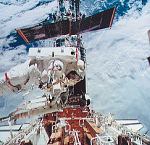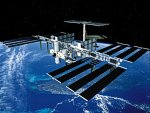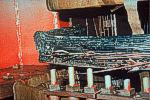The Weather In Space Is Frightful
 There’s
no need to run for cover from space weather. Storms from the Sun do not
harm life on Earth, but they do affect the way we live –particularly since
we rely so much on modern technology. Space weather can distort radio signals
and navigation devices such as Loran and the Global Positioning System.
In March 1989, listeners in Minnesota could hear the broadcasts of the California
Highway Patrol. Storms in space can disrupt and cut short the work of satellites.
There’s
no need to run for cover from space weather. Storms from the Sun do not
harm life on Earth, but they do affect the way we live –particularly since
we rely so much on modern technology. Space weather can distort radio signals
and navigation devices such as Loran and the Global Positioning System.
In March 1989, listeners in Minnesota could hear the broadcasts of the California
Highway Patrol. Storms in space can disrupt and cut short the work of satellites.
 In
January 1997, a communications satellite went dead just hours after a coronal
mass ejection (CME) struck the magnetosphere. The loss of that satellite
disrupted television signals, telephone calls, and part of a U.S. earthquake-monitoring
network.
In
January 1997, a communications satellite went dead just hours after a coronal
mass ejection (CME) struck the magnetosphere. The loss of that satellite
disrupted television signals, telephone calls, and part of a U.S. earthquake-monitoring
network. Space weather can pose a radiation hazard for astronauts. In August 1972,
an intense solar flare that occurred between the flights of Apollo 16
and 17 might have killed the astronauts if they had been on the way to
the Moon during that time.  Magnetic
storms can pump extra electricity into our power lines and pipelines,
causing blackouts and fuelleaks. In March 1989, a magnetic storm burned
up a $36 million electric power transformer in New Jersey and collapsed
the entire power grid in Quebec, Canada, leaving six million people without
electricity.
Magnetic
storms can pump extra electricity into our power lines and pipelines,
causing blackouts and fuelleaks. In March 1989, a magnetic storm burned
up a $36 million electric power transformer in New Jersey and collapsed
the entire power grid in Quebec, Canada, leaving six million people without
electricity.
| |
The Space Weather Center is part of the National Space Weather Program, with funding provided by NASA and the National Science Foundation. | |
|
Copyright © 2000 Space Science Institute, all rights reserved
Comments? Send email to webmaster@spacescience.org.